TALLAHASSEE, Fla.– Amanda Thompson said she will be the president of the United States.
Not wants to be or hopes to be but will be.Amanda Thompson said she will be the president of the United States.
Not wants to be or hopes to be but will be.
Just like she will be the attorney general of Florida, the governor of Florida, and the United States attorney general before reaching the Oval Office.
“That’s the plan,” she said. “I’m going to get there.”
Of course, there is some prep work to be done before she begins a career of service to her state and country.
First, Amanda, 17, is set to graduate this May from St. John Paul II Catholic High School (JPII), where she will be class valedictorian. She attends the parochial school in Tallahassee with the help of a Florida education choice scholarship managed by Step Up For Students.

Then it’s off to Harvard University, where she plans to double-major in government and history and earn a degree from its prestigious law school. Along the way, Amanda will pitch for the Crimson softball team with designs on leading the program to its first appearance in the Women’s College World Series.
As that unfolds, Amanda is determined to play softball in the Olympics. She has attended tryouts for Team USA and is a member of the United States Virgin Islands national team.
Taken separately, any one of her goals is ambitious.
But combined?
“She has very, very high expectations,” said JPII Principal Luisa Zalzman. “She’s a go-getter, a high achiever. She has a drive that is very mature for her age.”
“She's done everything she's ever put her mind to,” said Amanda’s mother, Ashley Williard. “She said she wanted to be valedictorian, and I said, ‘OK, go be valedictorian.’ And she did it.”
Amanda is a bundle of energy and confidence. On the softball field, she has a running dialogue with everyone – teammates, opponents, coaches, umpires. In the classroom, she’s involved in every class discussion.
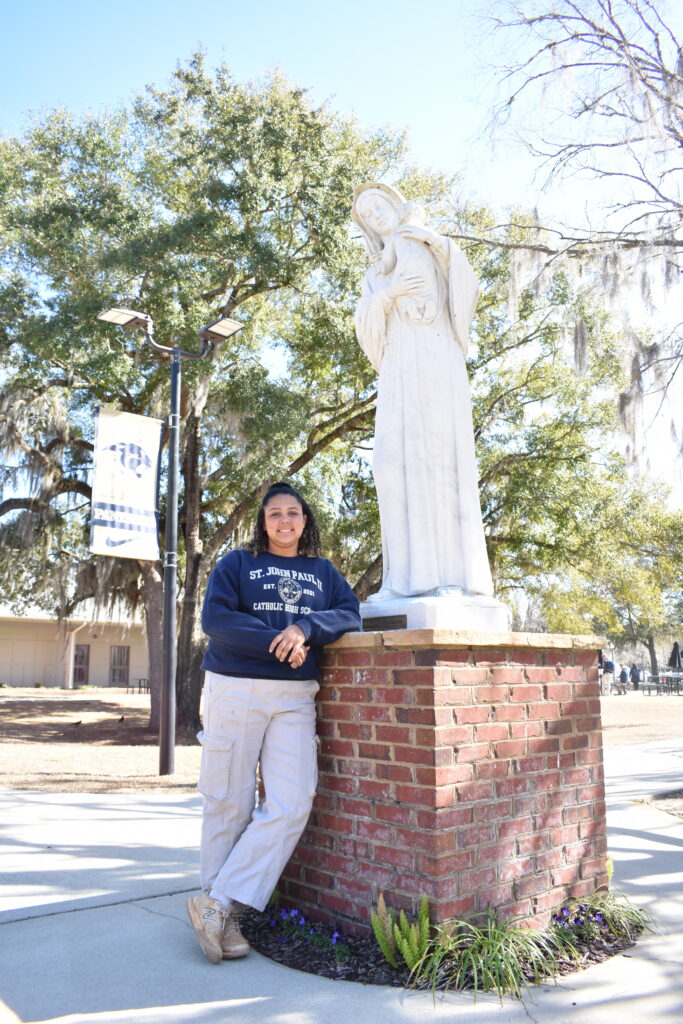
If you had approached her in August 2022 as she took the initial steps of her high school journey and told her she would graduate first in her class and be a member of Harvard Class of 2030, she would have been stunned.
“I would have said, ‘You got the wrong person.’ The difference between me then and me now is astronomical, and I think it’s because I attended this school,” she said. “It has to be.”
Amanda was a star as she rose through the ranks of the Tallahassee youth softball programs. Her parents, Ashley and James Thompson, envisioned their daughter earning an athletic scholarship to college. They were thinking of a high-end academic university like Duke or Notre Dame. That’s how Amanda, who attended her district schools until eighth grade, landed at JPII.
“We wanted a high school that was college-focused,” Ashley said. “Education is what we were looking for, and we could not have done it without Step Up For Students. No way could we afford to put her in that situation.”
There were “little things,” Amanda said, that shaped her academic future.
Her freshman English teacher encouraged her to write outside the margins during tests and essays.
“He said, ‘You don’t have to stay within this box. If you know more, write more on the paper.’ That stuck with me,” Amanda said.
Her freshman world history teacher announced to the class that Amanda scored the highest on the first test of the year.
“He congratulated me,” she said. “I thought that was insane.”
Midway through that semester, Amanda realized she had A’s in all her classes. That’s when she began to believe in herself as a student. Future valedictorian?
“Why not?” she said.
Amanda took AP World History as a sophomore and aced the AP test.
“That’s the class where I learned to learn,” she said.
Also, her love of history and government was born in that class, Amanda said. She can name all the countries of the world, tell you where they are located, and identify the flags.
“I’m working on my capitols,” she said. “It’s my hobby.”
Amanda took Spanish I and II in middle school and passed each, but not with grades that would stand out on a high school transcript. Sara Bayliss, JPII’s college advisor, suggested that Amanda retake those courses.
“She said the grades weren't good enough, that I could do better,” Amanda said.
Amanda retook both classes. She asked Principal Zalzman, a native of Venezuela, for tutoring help. The result was a pair of grades that fit proudly on the transcript Amanda sent to Duke. Duke was her dream school for education and softball.
And then Harvard called.
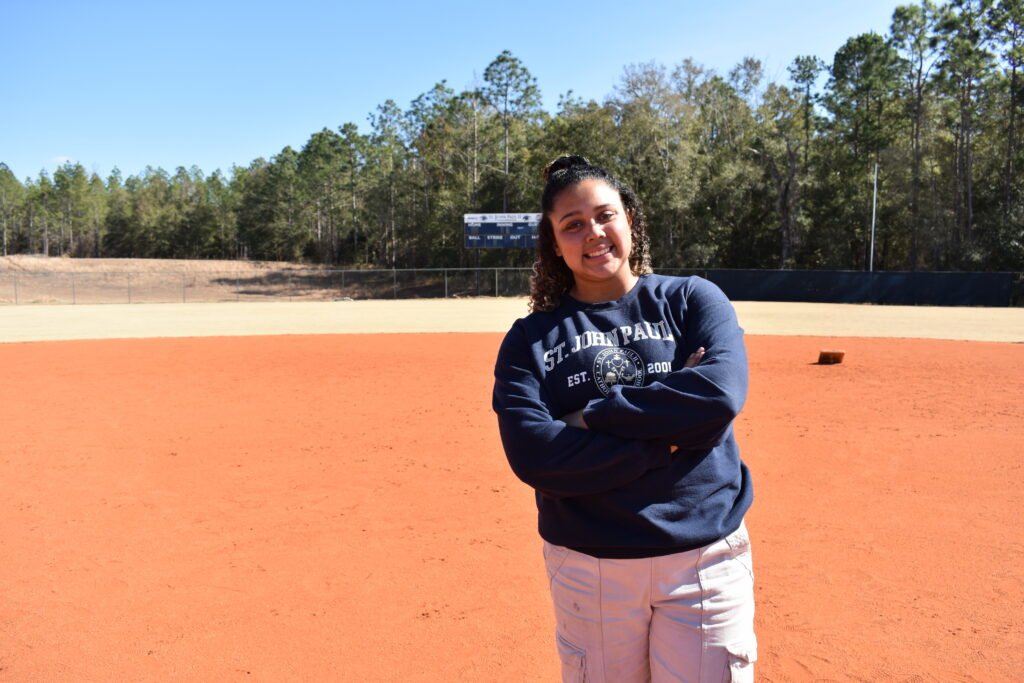
At midnight on Sept. 1 of her junior year – the first day college coaches can contact 11th graders – Amanda received a phone call from the Harvard softball coach.
“I didn’t even know they had a softball program,” Amanda said.
Intrigued, Amanda accepted a recruiting visit to the university located just outside of Boston. That trip marked the end of her Duke dreams.
“I want to make a difference in this world, and I think Harvard is the perfect school for me,” she said.
Terrence Brown, JPII’s softball coach, has watched Amanda emerge as an Ivy League student and a Division I softball player good enough to attend Team USA tryouts and earn a spot on the national team of a small territory with Olympic ambitions.
“She’s goal-oriented, and she doesn’t let anything get in the way of achieving those goals,” he said. “She’s worked very hard to get to where she’s going.”
Ashley and James are proud parents, but Ashley said they won’t take too much credit for Amanda’s success.
“We have nothing but pride,” Ashley said. “She is self-driven, self-motivated. We try to provide motivation. She’s missed proms and dances because of softball travel and schoolwork, and that was all her decision.
“There are a lot of sacrifices made to go along with this. She’s not afraid of hard work. She says she’s going to do something, and she goes out and does it.”
Updated Feb. 10, 2026
Record breaking interest continues with more than 400,000 students who have applied for Florida’s K-12 education choice scholarships for the 2026-27 school year.
Step Up For Students, the nonprofit organization that administers 98% of the state’s scholarships, opened applications for the 2026-27 school year on Feb. 1. A record 200,000 applied during the first three days.
By mid-day Feb. 10, a total of 300,106 students had applied for scholarships, which represents an 11.7% increase over the same 10-day period last year. By Friday morning, Feb. 27, a total of 401,507 students had applied.
Step Up For Students CEO Gretchen Schoenhaar said last week that the organization’s team and systems were ready for the surge of interest. Step Up’s technology systems processed 15% more applications on the first day this year than at the same time last year. Of the families who called for assistance, more than 90% reported being “satisfied” or “very satisfied” with the support they received.
“Another record number of applications on our opening weekend shows that Florida families increasingly value options in their children’s education,” Schoenhaar said. “Step Up For Students smoothly processed the higher demand and is prepared to support families every step of the way.”
During the 25-26 school year, more than 525,000 students have been funded on Florida’s K-12 scholarship programs to access learning options of their choice. If these students were counted as a single school district, it would be the largest in the state and third largest in the country. That makes Florida the national leader in education options.
However, not all students whose families apply end up being awarded or funded.
Step Up is focused on supporting growth. By the end of the year, Step Up expects to process 3 million reimbursements and a total of 3 million MyScholarShop e-commerce transactions.
Current scholarship families have until April 30 to renew their scholarships for the next school year. All families who want a PEP scholarship must also apply by April 30.
Private School and Unique Abilities Scholarship applications will be available through Nov. 15 for families who want a new scholarship.
Applications and more details are available here.
We will continue to update the numbers in this post until applications close.
AVE MARIA, Fla. – Toby and Nicole Mickelson were thinking about moving from Minnesota even before they heard about school choice in Florida. The weather, the politics, and the taxes were all getting to be too much, plus Nicole’s parents had recently become snowbirds with a winter home in southwest Florida.
Still, it wasn’t clear which warmer, less expensive, more conservative state they might move to.
But then a friend in Florida posted praise on Facebook for the state’s private school choice scholarships, which the Florida Legislature and Gov. Ron DeSantis had made available to every single student, beginning in the 2023-24 school year and are administered by Step Up For Students.
Toby and Nicole were stunned.
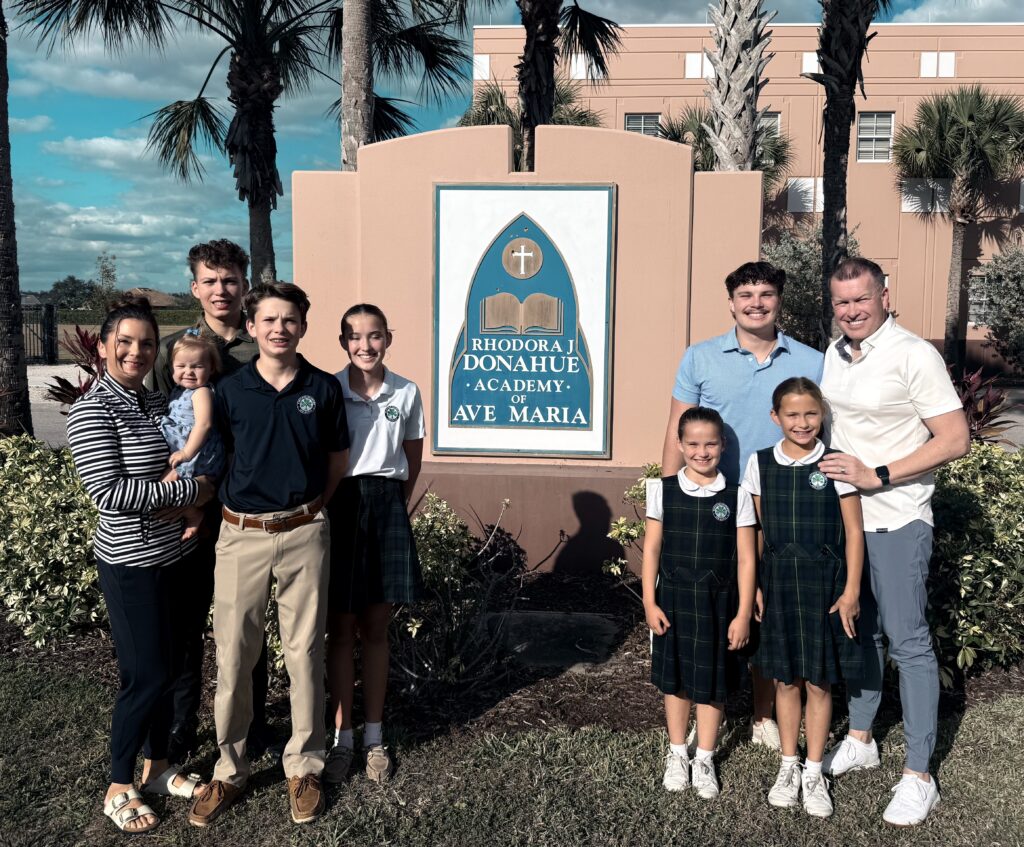
“I said, ‘Can you believe this even exists?’ Nicole said, “He said, ‘Are you kidding me?’ “
“Once we found out about the Step Up money, it (Florida) was a shoo-in.”
This was in the summer of 2024.
In early 2025, the Mickelsons applied to get their kids into Rhodora J. Donahue Academy, a classical Catholic school in Ave Maria, a predominantly Catholic community about 30 miles from Naples. In April 2025, their kids were accepted.
Incredibly, the family found the perfect house in Ave Maria and sold their home near Minneapolis almost simultaneously. By July, they were Floridians, with a month to spare before school started.
“We pinch ourselves every day,” Nicole said. “We’re so grateful to be here.”
The Mickelsons aren’t alone.
The Sunshine State has become a magnet for a whole new breed of transplants. We don’t have good numbers to quantify the trend, yet, but it’s easy to find families who moved here wholly or in part because 1) Florida offers generous school choice scholarships to every family, and 2) The education landscape is increasingly diverse because of all that choice, with more options for more families all the time.
At one school for students with special needs in Jacksonville, the families of 24 students — 10% of the entire student body — moved to Florida to access the school and the scholarships. At Donahue, according to the Diocese of Venice, at least two dozen students fit that description. Meanwhile, at a school for students with autism in the Tampa Bay area, a half dozen families moved from other countries or Puerto Rico.
The Mickelsons said families in Minnesota who hear about Florida’s choice scholarships initially “don’t believe it,” Nicole said. “They think it’s too good to be true.”
But, as the Mickelsons learned, they’re real.
Toby is an occupational safety manager for a commercial kitchen company and a member of the Air Force Reserves. Nicole is the vice president of sales for her family’s long-distance trucking business.
In Minnesota, they sent their kids to classical Catholic schools. For a big family, that wasn’t a breeze financially. Tuition per child averaged nearly $10,000 a year. “You can’t sustain that,” Nicole said.
Commuting was a challenge, too. One school was 20-30 minutes each way; the other, 30-40 minutes. “We lived in our cars,” Toby said.
The Mickelsons had some familiarity with Florida.
Four years ago, Nicole’s parents bought a home in Fort Myers, where they live for half a year. And three years ago, the Mickelsons visited Ave Maria University while they were checking out colleges with their oldest child. The university is also in the community of Ave Maria.
It was then that they learned about Donahue Academy, which is also a classical school.
Classical schools “teach a lot of classic books, like Dante’s ‘Inferno,’ not New Age-y things,” Toby said. For Donahue to also be a classical school was “icing on the cake.”
At the time the Mickelsons applied, Donahue had 440 students and a long waiting list. The Mickelsons weren’t sure they had a shot. But thankfully, the school was also in the midst of a huge expansion that would allow it to serve 615 students.
Donahue could be the poster child for another Florida-centered education trend, the revival of Catholic schools. Unlike Catholic schools in much of the country, Catholic schools in Florida are growing again. No region of Florida is showing more growth than the Diocese of Venice, which includes the cities of Fort Myers, Naples, Sarasota, and Bradenton.
“My husband said, ‘Let’s apply, let’s do the paperwork. If they get in, that’s our sign to move,'" Nicole said.
After praying and fasting, they got a thumbs up.
The Mickelsons have seven children. The oldest is in college. The next-oldest is homeschooled. Four attend Donahue, in grades 9, 7, 5, and 2, respectively. The youngest is a year old.
Nicole said school choice wasn’t the only reason for the move to Florida, but she put it at the top of the list, followed by politics, taxes, weather, and her parents living nearby. She said Donahue probably wouldn’t have been affordable without the choice scholarships.
In Ave Maria, the Mickelsons no longer worry about the long commutes, either. They live a few blocks from the school, so the kids bike there. “It’s like a dream,” Nicole said.
The plan is for the kids to graduate from Donahue, then attend Ave Maria University.
Nicole and Toby are both able to work remotely. And now that everything in Florida is working out so well, word is getting back to their friends in the Gopher State.
One family recently pulled their kids out of Catholic school because they could no longer afford it. For now, they’re homeschooling. But thanks to school choice, Florida looks mighty enticing.
Said Nicole, “I have a lot of Minnesota friends who want to move to Florida now.”
VALRICO – Gov. Ron DeSantis announced Wednesday morning that Florida will opt in to the nationwide Federal Scholarship Tax Credit program established in August by the Trump Administration.
The federal program, which will launch in 2027, is designed to bring education choice to families across the country. In doing so, it will give families from coast to coast what those in Florida have enjoyed for more than 20 years – the final word in the education of their children.
“The great stuff we're doing here probably is going to be pretty groundbreaking in states that have not yet gone down the road of school choice,” DeSantis said. “But here we are, further empowering residents and families to be able to make the most around the country.”
The federal program allows individual taxpayers to contribute to approved scholarship granting organizations, enabling students from a wide range of backgrounds to pursue the learning environment and educational resources that best fit their needs. Students in both public and private schools will benefit from resources that support tuition, tutoring, educational tools, technology, and special academic programs.
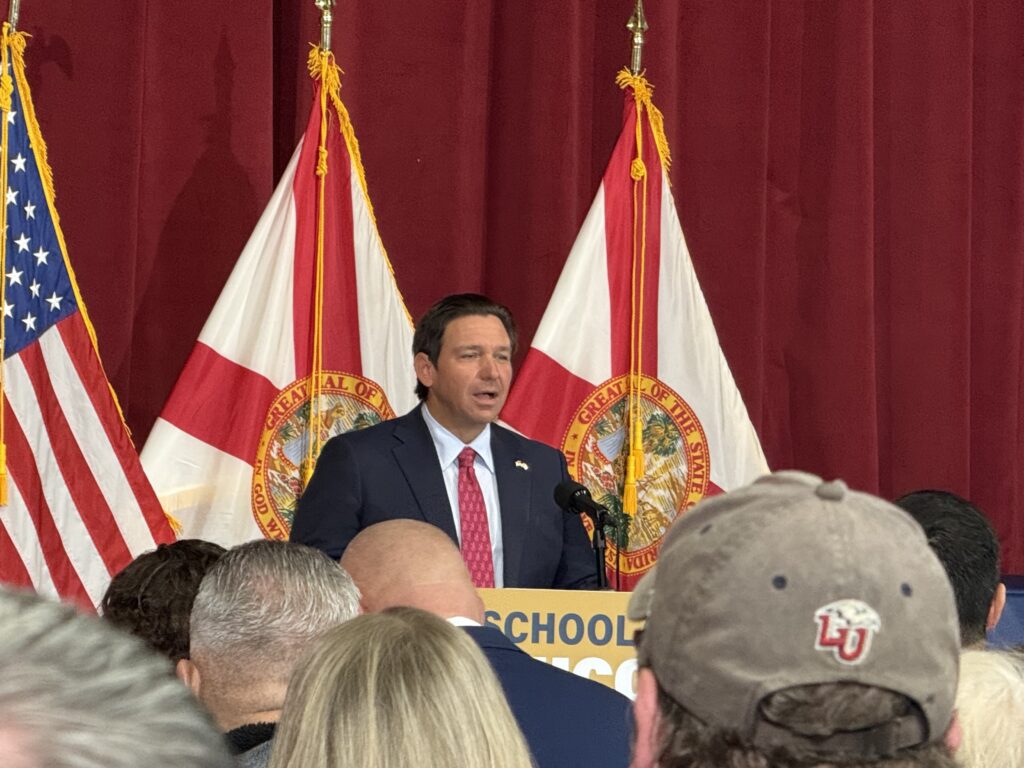
Step Up For Students, the Florida non-profit that manages the state’s education choice programs, will participate in administering the federal program by establishing the Step Up, Step Further Scholarship Fund, a separate 501c3 non-profit.
DeSantis made the announcement at Grace Christian School in Valrico as part of National School Choice Week. The school has 682 students on a Florida choice scholarship. The governor stood at the dais behind a sign that read, “School Choice Success. Florida is leading the nation.”
Anastasios Kamoutsas, Florida’s Commissioner of Education, followed DeSantis to the dais and said more than 1.4 million students in Florida benefit from a school choice option. More than 500,000 students receive one of the education choice scholarships.
DeSantis mentioned that Florida was the pioneer in education choice scholarships for students with unique abilities and for families who want to homeschool.
“Where do we rank in homeschooling? Do you know? At the top,” DeSantis said. “So we do good in homeschool because we embrace it and we empower.”
Kamoutsas said the purpose of National School Choice Week is to celebrate the freedom and opportunities that come with it.
“In Florida, that principle guides all that we do, and our students are better off because of it,” he said. “This week has been a time to showcase Florida's leadership in building the largest and most comprehensive school choice program in the nation.”
A Tampa Bay area morning TV show kicked off National School Choice Week by highlighting a family who benefits from a state K-12 scholarship.

Arielle Frett appeared on Fox 13’s “Good Day Tampa Bay” program on Monday with her son, AnyJah, a ninth grader at The Way Christian Academy in Tampa. She said she moved to Florida from St. Thomas, Virgin Islands, in 2017 to find better educational opportunities for AnyJah, who has severe autism.
“No teachers were able to work with him on his level,” Frett told Fox 13 reporter Heather Healy. “Most of his learning in English and math are on fifth and sixth grade levels now.”
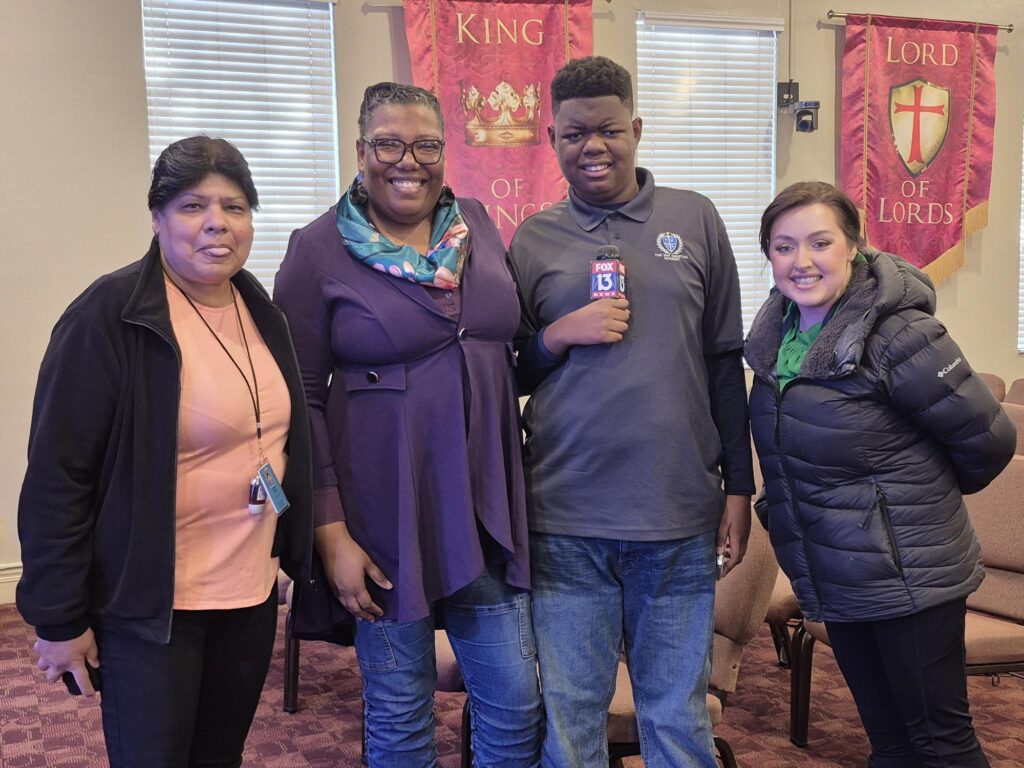
A U.S. military veteran and single mother of two, Frett said she would not have been able to afford a private school for her son without the scholarship.
She said AnyJah, who receives the Family Empowerment Scholarship for students with Unique Abilities, is “loved, protected, and thriving” at his school, where class sizes of 10 to 12 students allow for more individual attention. He can also receive his therapies during school.
The segment also featured information about Florida’s robust education choice options. Those include traditional public schools, district magnet schools, charter schools, private schools, microschools, homeschools, virtual schools, and customized education programs that allow parents to mix and match.
“We’ve gone from education and funding through the system to now empowering families by putting the money in their hands and allowing them to make the most appropriate educational decisions for families,” said Keith Jacobs, director of provider development at Step Up For Students, which administers most of the state’s education choice scholarships.
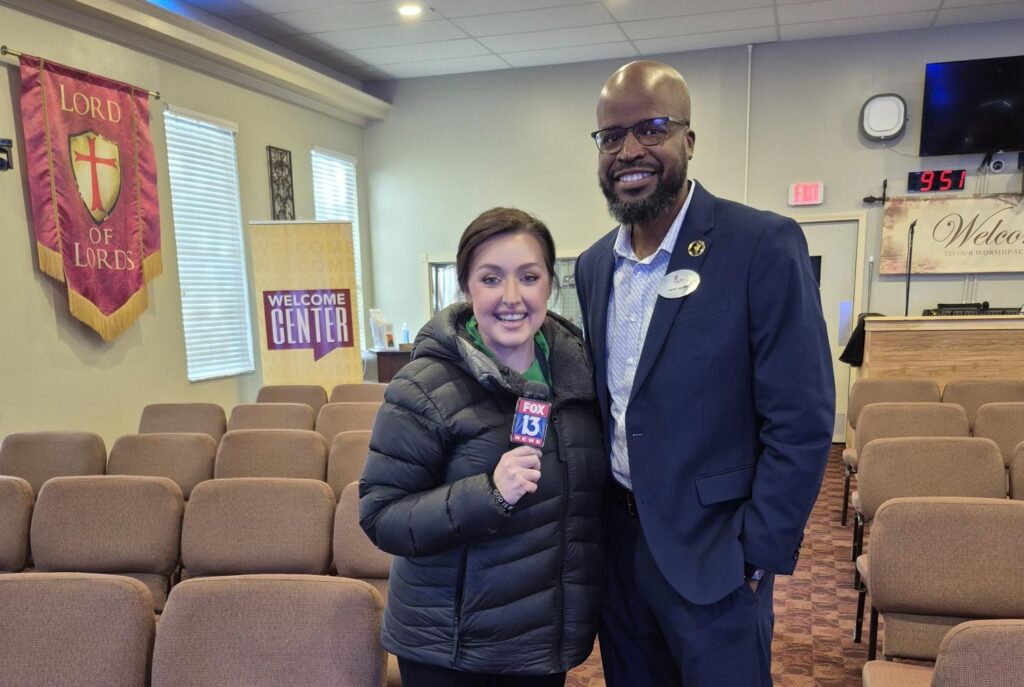
Jacobs has spent the past year working with school districts to provide individual courses to scholarship families whose students do not attend public or private school full time, paid for with scholarship funds. About 70% of Florida school districts are participating.
The scholarship application season for the 2026-27 school year begins Feb. 1. Visit Step Up For Students to learn more and apply.
By Ron Matus and Julisse Levy
HUDSON, Fla. – In 2022, Joel Hernandez and his wife, Norma Torres, had to find a new school for their then-9-year-old daughter, Fabiola. In their part of Puerto Rico, they felt their options were, at best, limited.
Fabiola is on the autism spectrum. Over the years, her parents visited and/or researched every public and private school in the area that served students with special needs. It was not a pretty picture.
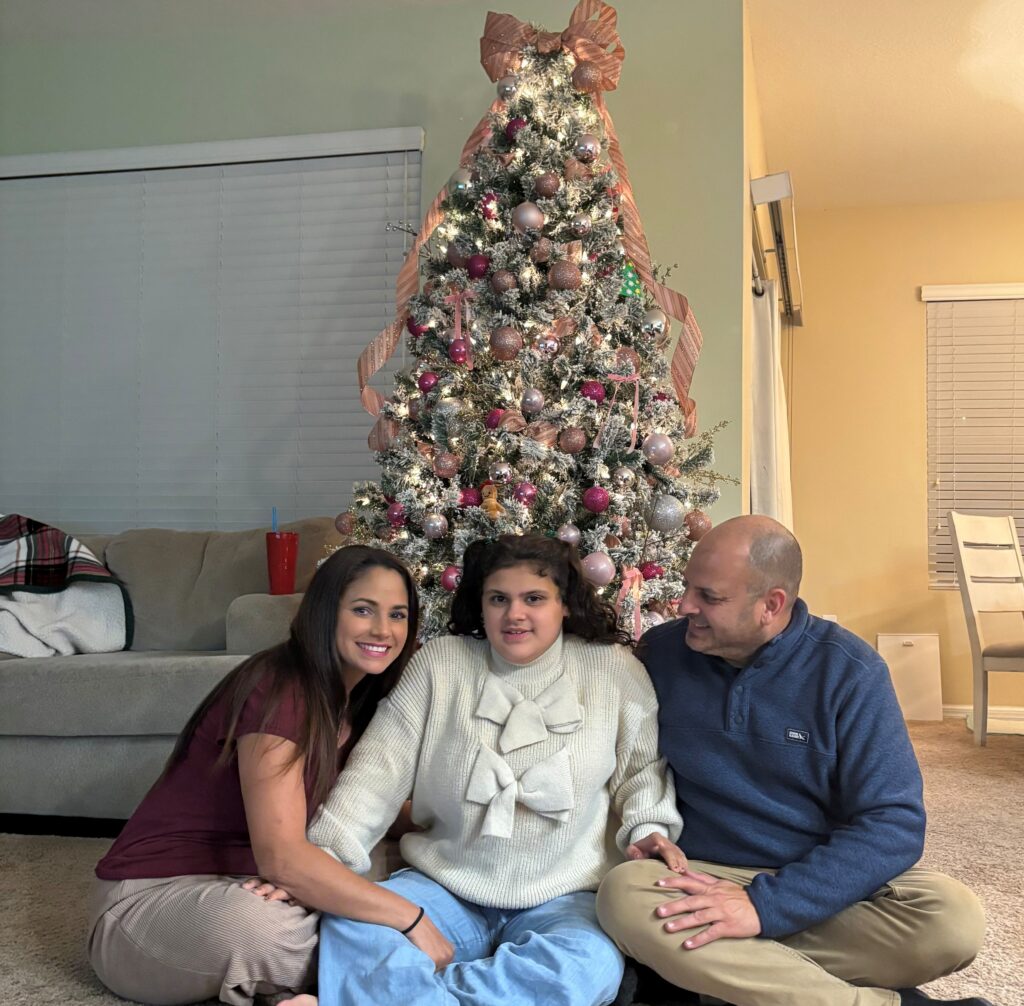
In some, up to 30 students with vastly different learning and support needs were crammed together in the same classrooms. In one, students with a wide range of ages and special needs were grouped in a room that doubled as storage for desks, tables, and other equipment. Yet another was so lacking in security that Hernandez walked from the entrance to the classroom without anybody asking who he was or what he was doing.
In the end, the couple settled on a school that looked good on paper. But it turned out to be a bust, too. It never delivered on promises of regular speech and occupational therapy.
Fighting for Fabiola left the couple drained. Their daughter needed every opportunity to gain skills that would allow her to live as independently as possible as an adult, and it wasn’t happening.
“We spent nights crying,” Hernandez said. “We looked at each other every day and said, ‘What are we going to do?’ “
As things grew desperate, the couple began to consider moving to the states for better educational opportunities, and more specifically, to Florida, where they had enjoyed time on vacation. When they began researching schools in the Sunshine State that served students with autism, one immediately jumped out.
It had Hope in its name.
'I knew it was meant to be'
Hope Ranch Learning Academy is a K-12 school with 250 students an hour north of Tampa.
From the school website, the couple could see a campus awash in moss-draped oaks. To them, it looked calming. The school featured equine therapy, which Fabiola experienced in Puerto Rico and loved. It was also a Christian school, which was very important to the family.
Incredibly, Hernandez and Torres also saw a familiar face on the website, a girl who had been Fabiola’s friend years prior.
“God intervened,” Hernandez said. “I knew it was meant to be.”
The couple contacted the girl’s family, who referred them to a school administrator. The woman told them that Hope Ranch had a long waitlist — it’s now more than 80 students — and they had to be Florida residents to get on it. She asked, “Do you really want to move because of the school?”
“That was the a-ha moment,” Hernandez said. “We said, ‘In Puerto Rico, we have nothing for our daughter. We have to move.’”
Private school boom, scholarships, draw families
Families are moving to Florida because of its schools and school choice.
It’s not just the abundance of state choice scholarships, which average $8,000 or $10,000 each and are now available to every family. It’s the entire, choice-driven system. Florida’s education landscape is becoming more diverse and dynamic by the day, as the families of 500,000 students using scholarships (and growing) shape it with their preferences.
In the past 10 years alone, the number of private schools in Florida has grown by a third. That’s a net gain of more than 700 private schools, which is more than 39 states each have, period. And what’s more impressive than the number is the variety.
Schools like Hope Ranch, which was a semi-finalist for the Yass Prize in education innovation, are not anomalies. High-quality schools serving students with special needs have emerged in every corner of the state, and some are now drawing families from out of state. At the North Florida School of Special Education, for example, the families of 24 students moved from out of state, including this family from Maryland.
At Hope Ranch, a half-dozen families have even moved from other countries or Puerto Rico.
Equine therapy and transition program set Hope Ranch apart
In Puerto Rico, Hernandez taught marketing at a college and sold beauty supplies. Torres worked as a nail technician. Moving to the States obviously would mean leaving friends and family and starting over with new jobs, a new house, everything. But Fabiola’s future depended on it.
In November 2023, the family and their three dogs moved into their new home, 12 miles from Hope.
Since Fabiola couldn’t attend the private school right away, her parents enrolled her in the neighborhood public school. It turned out to be excellent. One teacher in particular paid extra attention to Fabiola and made sure she got the help she needed, including a full-time, 1-on-1 assistant.
“There’s always an angel over Fabiola,” Hernandez said.
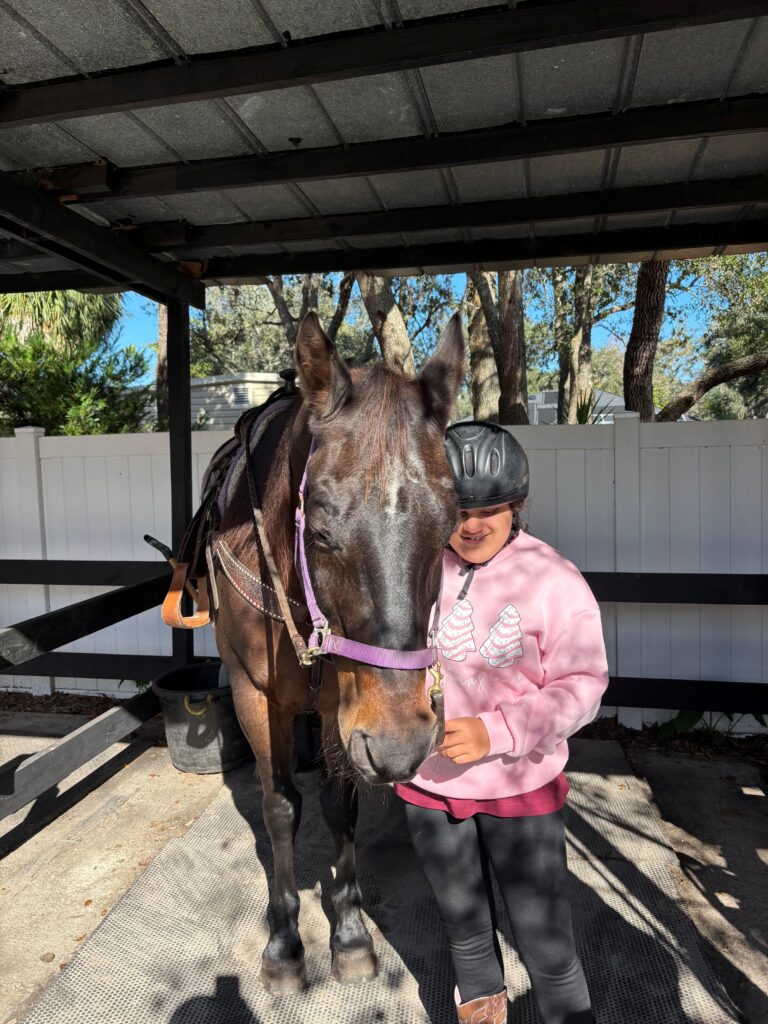
Hope Ranch, though, remained ideal. Besides the equine therapy program, the school operates a highly regarded transition program that prepares students for independent living as adults. In December, the Yass Prize awarded Hope founders Jose and Ampy Suarez an alumni grant, so they could build a separate high school campus and expand the transition program.
Hernandez periodically checked in with Hope to see how much the waitlist was shrinking. Finally, in June 2025, the administrators invited the family to the school so they could share the good news in person.
Fabiola was in.
Family credits school choice scholarship for making Hope Ranch affordable
Classes started in August. Just a few months later, Hernandez said the change in Fabiola has been “astronomical.”
Fabiola smiles more. She’s happy when she wakes up. She’s happy on the way to school.
She’s more independent, confident, communicative. She doesn’t cover her face as much as she used to. She tries to verbalize more. She makes eye contact more often.
“She wants to play with other children now,” Torres said. “She feels included. They grab her hand and say, ‘Come with us.’ “
Last month, Fabiola and the other Hope Ranch students performed a stage version of “The Little Drummer Boy” for students at a nearby high school. Fabiola was on stage for an hour.
“I know she has to progress more,” Hernandez said, “but we feel very good.”
None of this would have been possible without Florida’s choice scholarship, he said. The family couldn’t afford Hope Ranch without it.
The school told the family about the scholarship. But Hernandez couldn’t believe how easy it was to get.
In Puerto Rico, he and Torres were accustomed to filing all kinds of education requests on Fabiola’s behalf and waiting long stretches for answers. With the scholarship, they got the award notice within 24 hours of applying. “I thought I was going to have a heart attack,” Hernandez joked.
“We had this in our dreams, but we didn’t know it could come true. Florida and Hope were a dream come true,” Hernandez said as he started to cry.
“I’m sorry I have to cry, but it’s very emotional,” he continued. “In Puerto Rico, all we had were problems” with Fabiola’s education. “Here we have solutions.”
Some quotes in this story were translated from Spanish to English with the assistance of Julisse Levy, director, head of business Initiatives, Federal Scholarship Tax Credit, at Step Up For Students.
TAMPA, Fla. — The words on the trophy read “Future Philanthropist,” and Mrs. Finley, who taught fifth grade that year, cried when she presented it to Andrew Weber during graduation.
Andrew smiled at the memory.
“It was one of the highlights of my elementary school career,” he said. “Mrs. Finley said I was one of her favorite students. That meant a lot to me.”
So did receiving the trophy, which still holds a place of honor on his nightstand.
“It made me realize my potential and how I can help others,” Andrew said.
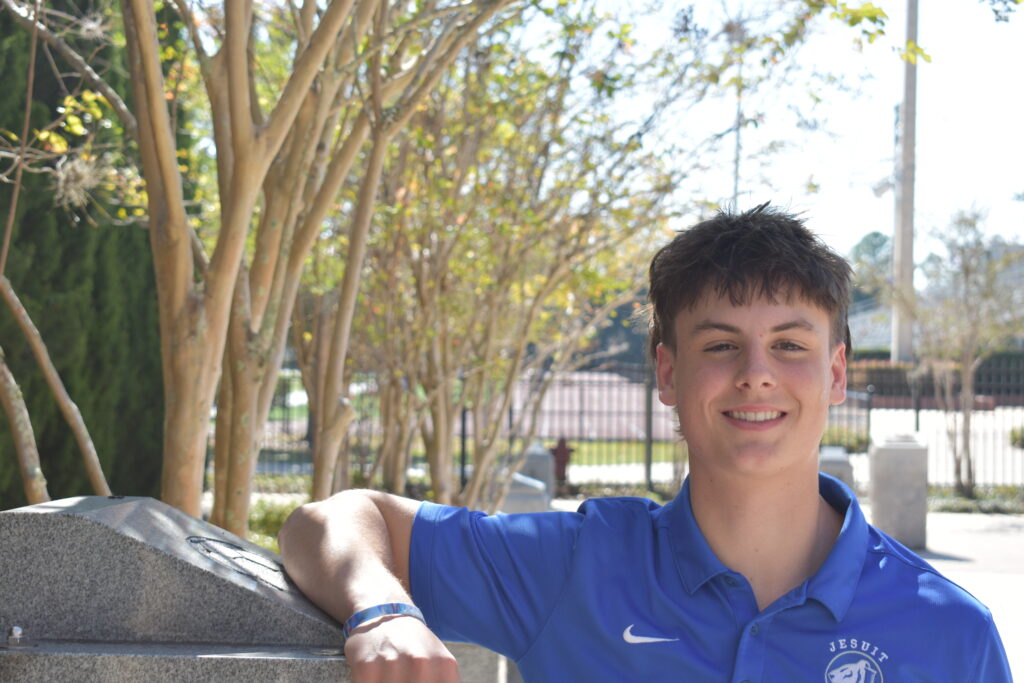
Almost seven years later, Andrew, a 17-year-old senior, is nearing another graduation, this time from Jesuit High School, the Catholic school in Tampa he attends with the help of a Florida education choice scholarship.
The altruistic nature Mrs. Finley saw in Andrew when he was in elementary school blossomed during the ensuing years.
Jesuit’s mantra is “Men for Others,” and Andrew embodies that.
“He does 100%,” said Andy Wood, Jesuit’s athletic trainer and track and field coach, and the school’s former director of community service. “Andrew is one of our top students. And when you talk about a total package, including his community service work, being a student athlete, he's what we envision our seniors being at graduation.”
Andrew volunteered for eight service organizations while in high school.
He made two trips to an orphanage in Guatemala with his Jesuit classmates, feeds people at Metropolitan Ministries, and delivers Meals on Wheels with his mother, May.
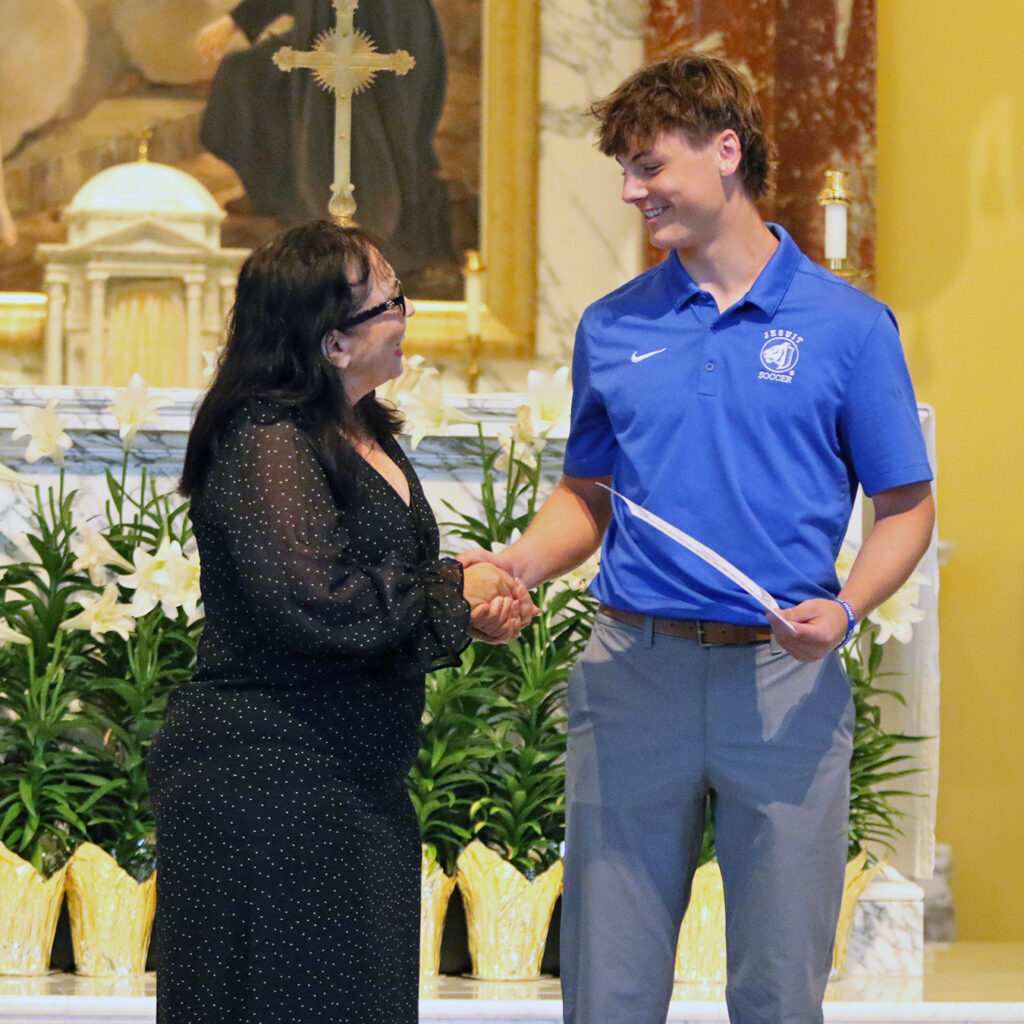
He’s volunteered for the Faith Café, the Young Men’s Service League, Teens United Florida, the Leukemia and Lymphoma Society, and the Ryan Nece Foundation, a non-profit founded by a former Tampa Bay Buccaneer that empowers teens to become leaders through volunteering.
Andrew traveled to Asheville, North Carolina, last June with the Ryan Nece Foundation to help families with home repairs still needed after the flooding caused by Hurricane Helene.
He is a pole vaulter on the track and field team, and in his spare time, he plays the piano at a local nursing home.
As a junior, Andrew received the Anne Frank Humanitarian Award from the Florida Holocaust Museum in Tampa for his outstanding humanitarian efforts.
Andrew’s parents, May and Tim, raised him and his older sister, Elise, to be community-minded. Elise, now a sophomore at the University of Georgia, also volunteered for the Ryan Nece Foundation while in high school.
“As his parents, we always wanted Andrew to be very involved in a lot of things and explore different passions, and luckily for him, many of those passions really stuck,” May said.
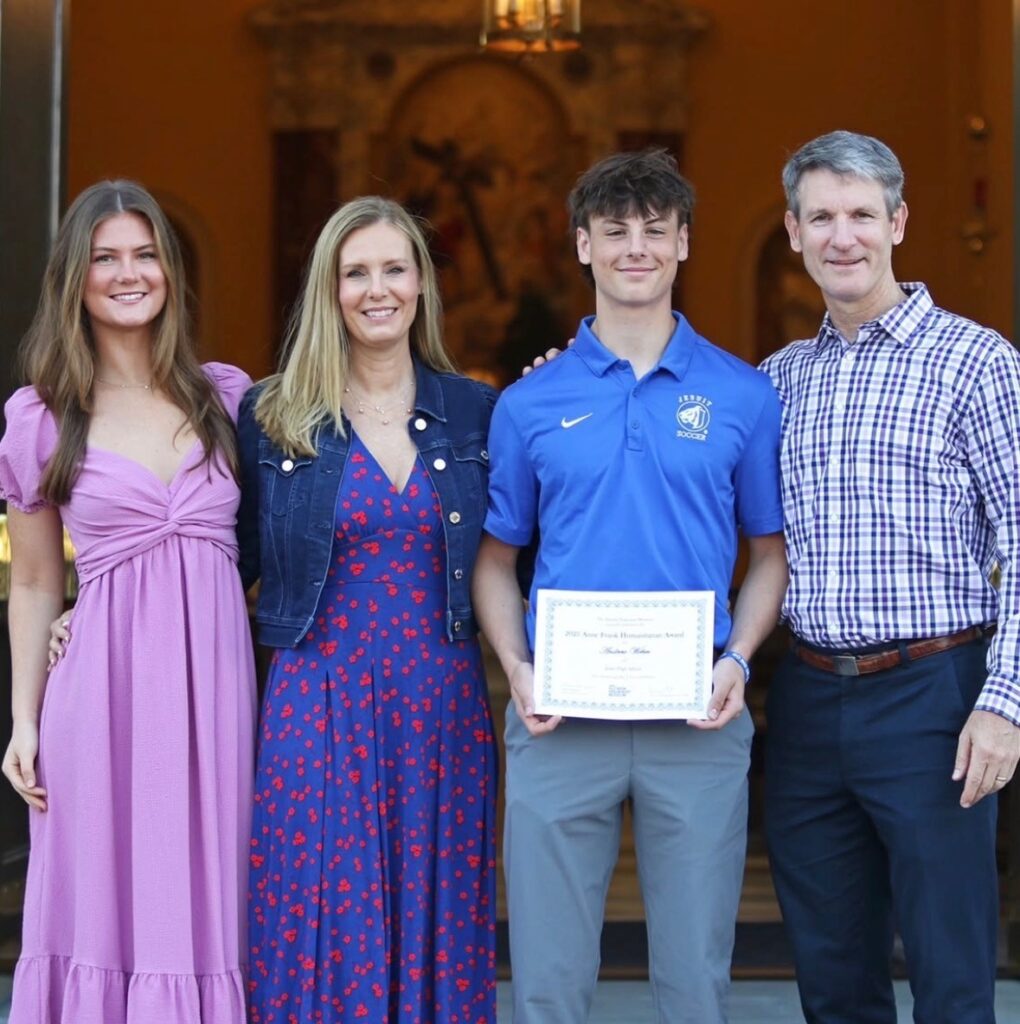
Andrew set the foundation in elementary school when he sold lemonade, handmade crafts, and rocks (crystals and gems) from a stand in the front yard of the family’s Tampa home. He said he would raise maybe $100 over several weeks and donate the money to charities such as Dogs Inc (formerly Southeastern Guide Dogs).
“I was 8,” he said. “I felt the money could benefit other people more than it could benefit me.”
“His heart was always generous,” May said.
For a teenager as service-oriented as Andrew, he certainly found a home at Jesuit, where students are required to complete a minimum of 150 hours of community service during their four years. Andrew, though, has accrued more than 500.
Yet, the decision to attend Jesuit was not easy.
“It was a very hard decision,” Andrew said.
His options were these: his district school, where Elise was a rising junior and where a lot of his friends were headed, or Jesuit, an all-male parochial school with demanding academic standards.
For help, Andrew turned to his role model: his big sister.
“She said, ‘Andrew, if you pass up this opportunity, you might regret it for the rest of your life.’ So I said, ‘I'm going to listen to you,’” Andrew said.
Thinking back on it now, Andrew added, “She was right.”
He has no regrets.
Andrew’s two trips to Orfanato Valle de Los Angeles (the Valley of the Angels orphanage) outside of Guatemala City with his classmates opened his eyes to how fortunate he is to live in America.
The orphanage did not have air conditioning, and hot water was spotty at best.
Wi-Fi? Yeah, right.
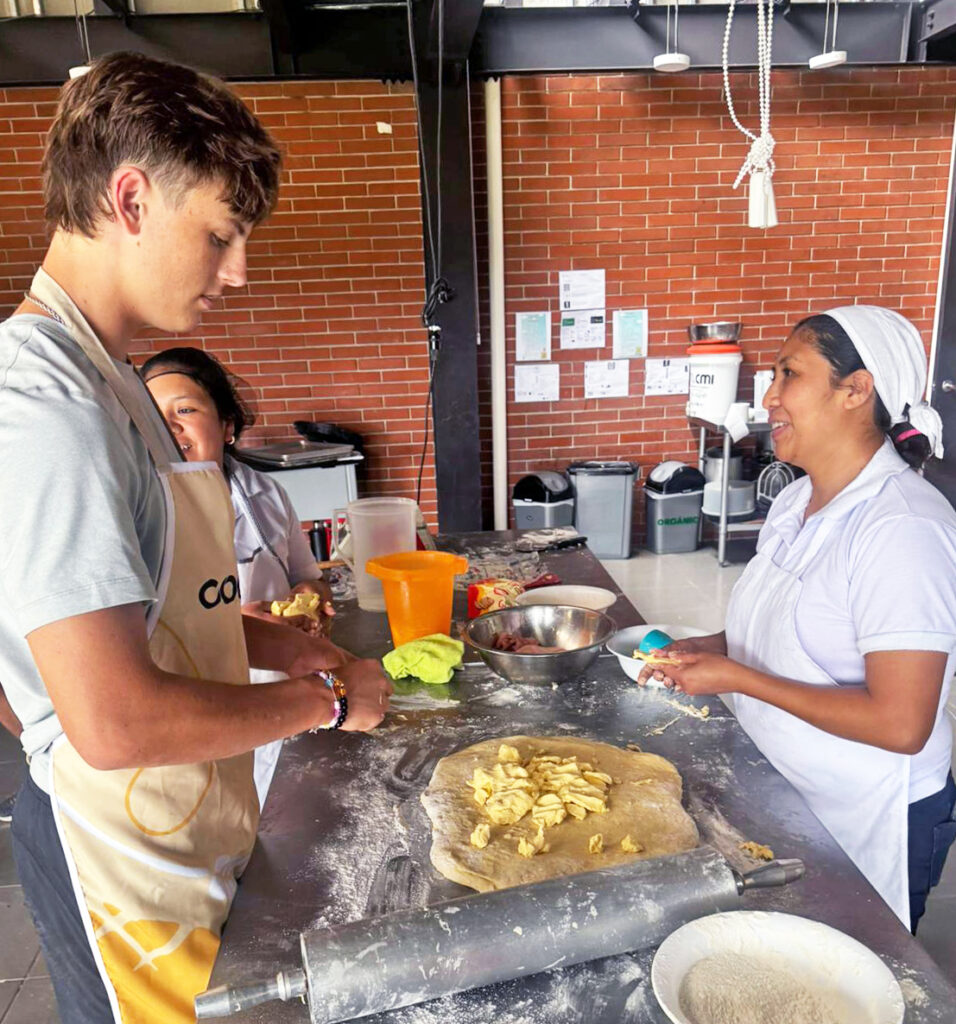
“I just put down my phone and started living in the environment, living how these kids live, and I realized that life can be fun,” Andrew said.
The Jesuit students spent nine days with at-risk children, teaching them English and about their faith.
Andrew called the experience “life-changing.”
“In Tampa, we really live in a bubble,” he said. “There are things I don’t take for granted anymore.”
Like AC, hot water, and a strong Wi-Fi signal.
And how a simple act of kindness can make a world of difference in someone’s day.
During the summers, he and his mom deliver Meals on Wheels to older adults and others unable to leave their homes without difficulty. It’s a bonding moment between the two, quality time spent together for a mom and her son.
“It's probably my favorite thing that we have done together,” May said.
“It’s the favorite thing that I do,” Andrew said.
They don’t rush through their route. Instead, they spend a few minutes at each stop, checking on the people receiving the meal, making small talk, and letting them know they matter.
When they first started delivering the meals, May told Andrew: “We’re probably the only people they're going to talk to that day, so even though this is sort of a blip on your radar, this is their day; this is their weekend; this is their week. So, make it count.”
Andrew took that lesson to heart.
A man for others.
“I feel like if I were in that situation where I needed help, I obviously want someone to do the same thing for me,” he said. “Spreading Jesuit’s values across what I do is a big part of why I do it. What I've learned here, it really propels me to do what I do in such a great way.”
Andrew wants to major in business in college. Where? He hasn’t decided. His choices are the University of Georgia, the University of Tennessee, Boston College, and Florida State University.
Where will that major lead him? He’s not sure.
“I can tell you it will be with people,” May said. “Whether it's finance or accounting, marketing or entrepreneurship, his love is working with people. I think it's just what comes naturally to him. He motivates people and makes people feel better about themselves. So, that’s my prediction.”
Each school day at 2:35 p.m., Joshua Jones enters a classroom at Crescent City Junior-Senior High School and settles into an agriculture class for eighth graders.
It’s the only class Joshua attends at the school, located about six miles from his home. And it caps the academic portion of his day, which starts at 8:30 a.m. sharp when he and his younger siblings, Jacob (sixth grade) and Kylie (fourth), begin their home education with their mother, Ashley.
The Jones children receive Personalized Education Program (PEP) scholarships available through the Florida Tax Credit Scholarship Program and managed by Step Up For Students. PEP offers parents flexibility in how they spend their scholarship funds, allowing them to tailor their children’s learning to meet their individual needs and interests.

PEP allows families access to services and classes at public, charter, or virtual schools, adding another layer to hybrid learning for those who home educate.
Since the passage of PEP as part of House Bill 1 in 2023, 36 of the state's school districts are offering services to students with education savings accounts, with 12 more in the pipeline, according to Keith Jacobs, director of provider development at Step Up For Students. Those include some of Florida's large districts, such as Miami-Dade, Orange, and Hillsborough, as well as more rural districts such as Baker and Putnam, where the Joneses live.
That’s a welcome addition to the more than 500,000 students who are using state K-12 scholarship programs in Florida, where 51% of all students are using some form of choice.
Ashley and her husband, Daniel, use a portion of Joshua’s PEP funds to pay the Putnam County School District for Joshua to take the agriculture class and the fees for him to run cross country and play junior varsity soccer and baseball for the Raiders.
“This is a good opener for this year to figure out how this will work and if he will like it,” Ashley said.
Ashley used to teach elementary school music, art, and physical education. She is currently the girls' varsity volleyball coach at Crescent City Junior-Senior High and runs the local club volleyball program. Three years ago, she and Daniel, the pastor at South Putnam Church in Crescent City and a nurse at a hospital in Palatka, decided to home educate their children.
“The class sizes just were not feasible to me,” Ahsley said. “There were too many kids in the classroom. I love their teachers. I know them personally, but somebody’s going to get left behind. Somebody’s not going to get everything they need.
“Daniel and I decided that since I'm teaching kids anyway, I should be teaching mine. They're going to get so much more out of it, because it's just me and them.”
Joshua said he enjoys learning at home.
“We get done with school a lot quicker and have a lot more time to do things while still being able to learn,” he said.
Ashley teaches her children from 8:30 a.m. until the early afternoon. After that come chores and activities they can do outside in the fresh air and sun.
“My thing is this: I have intelligent children who I can teach, and they can be advanced and do it as fast as they want to, and that’s great. It just makes sense to me. This is the best model for us,” Ashley said. “I know it's not for everyone.”
The children are active in the community, are involved in sports and have a ton of friends, especially Joshua.
“He enjoys his social life,” Ashley said.
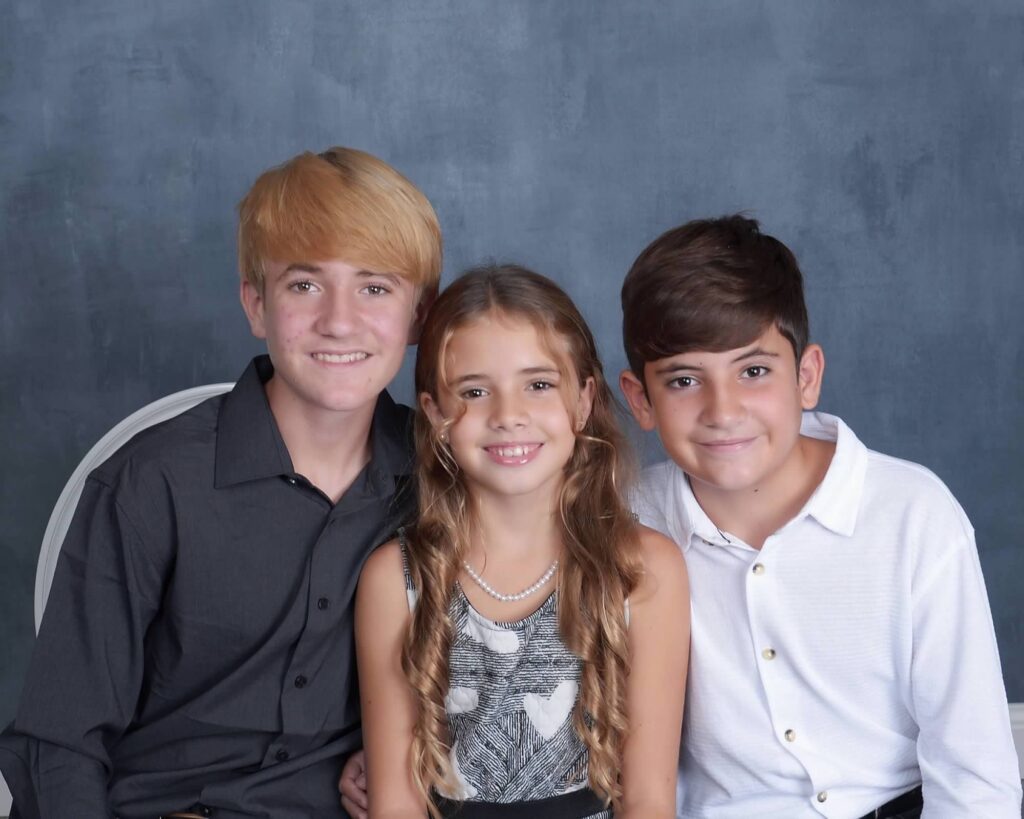
Crescent City is a small community. The city itself is less than three square miles with a population of fewer than 1,700. Ashley said it doesn’t lend itself to home education co-ops and chances for the Jones children to interact with other home-educated students during the day.
“That was the biggest piece that was missing for Joshua, going to school and seeing friends,” Ashley said.
So, when the opportunity was created for Joshua to return to a brick-and-mortar school, even on a limited basis, his parents pursued it. The agriculture class meets during the last period of the day, and Joshua was headed there anyway for sports.
Ashley called it a “great compromise.”
“He's going there to do something that he likes,” she said. “He loves the animals. He loves to learn about them. He’s going there for one of his electives, so that's one less thing that we do at home.
“He's already going to the school at the end of the day anyway, so now he just gets to see his friends and interact with people, and he's in a teacher setting, which I think is a good thing, too. It is hard when it's always mom. So, I think having a teacher also teaches life skills, so I don't think that's a bad thing at all.”
Joshua said he wants to continue with an agriculture class next school year. He would also like to join Future Farmers of America.
“It’s fun,” he said. “I get to go back to the school so I can still hang out with my friends and still get to take a class there.
“I do love learning about animals.”
ST. PETERSBURG, Fla. – Life, it’s often said, is what happens when you’re making other plans.
Tasia Mathis planned on joining the U.S. Navy Reserve. Then her grandmother, with whom Tasia and her younger brother Jeremiah lived with, died suddenly from complications of kidney failure.
“The papers were signed, but I wasn’t able to go through with it,” Tasia said. “I had to make sure he was OK.”
Tasia, 20 at the time, became her brother’s guardian.
While Tracy Crawford’s passing in June 2023 ended Tasia’s goal of joining the Navy, it didn’t end her goal of a bright future for herself and Jeramiah.
For that, she credits Florida's private school scholarships managed by Step Up For Students.
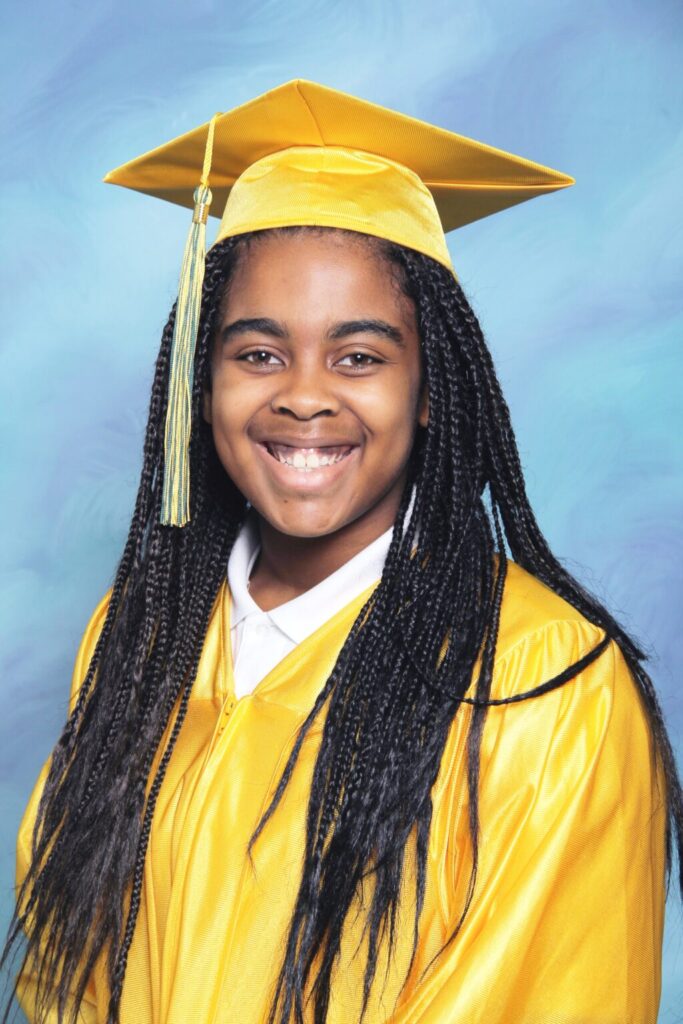
The scholarships enabled Tasia, now 22, and Jeremiah to attend Academy Prep Center of St. Petersburg for middle school and allowed Jeremiah, 15, to continue his private school education at Admiral Farragut Academy in St. Petersburg, where he is a sophomore this year.
“(The scholarship) gave us the opportunity to go to a school that we probably wouldn't be able to go to,” Tasia said. “It gave us the opportunity to expand our knowledge so good things can come into our lives.”
Tasia is studying to become a phlebotomist and works as a teacher at the Academy for Love and Learning in St. Petersburg.
Jeremiah would like to attend the United States Air Force Academy and work in cybersecurity.
The two, who share an apartment in St. Petersburg, have goals and are working toward them with a determination forged by Tracy Crawford, their grandmother, and reinforced by their years at Academy Prep.
“They don’t let you give up,” Tasia said when asked what she liked about attending Academy Prep. “Even if you had issues, they never let you give up.”
Could you blame them if they did?
Tasia was 8 and Jermiah was three weeks old when their mom died. Staci Crawford was only 34 when she suffered a heart attack. That left the children in the care of their grandmother, whose failing health forced Tasia to find work as a counselor at the Police Athletic League when she was 14.
“I had to help out with the bills,” she said. “By the time I was 16, I was cooking, washing everybody's clothes, helping my grandmother out the best I could.”
So, when asked what it’s like to have his sister as his guardian, Jeremiah said, “It’s kind of all I’ve known.”
Tracy wanted Tasia to attend a school that would challenge her academically and offer a safe environment. That’s why she used the private school scholarship to send her to Academy Prep.
At first, Tasia said, it wasn’t a good match. She was not a fan of the school’s long days (7 a.m. to 5 p.m.) or the fact that she had to wear a uniform.
“It took her a while to buy in, and then once she did, she was a high-achiever, and she set the tone for the other kids,” said Lacey Nash Miller, Academy Prep’s executive director of advancement.
For that, Tracy gets a big assist.
“She made sure my grades were straight, my attitude was straight,” Tasia said. “By seventh grade, it all came together.”
For high school, Tasia attended her assigned school because it offered a BETA (Business, Entrepreneurial, Technology Academy) program that interested her.
Jeremiah attended his assigned elementary school, but Tracy wasn’t a fan of his assigned middle school.
“It wasn’t up to her standards,” Tasia said. “She wanted to challenge him.”
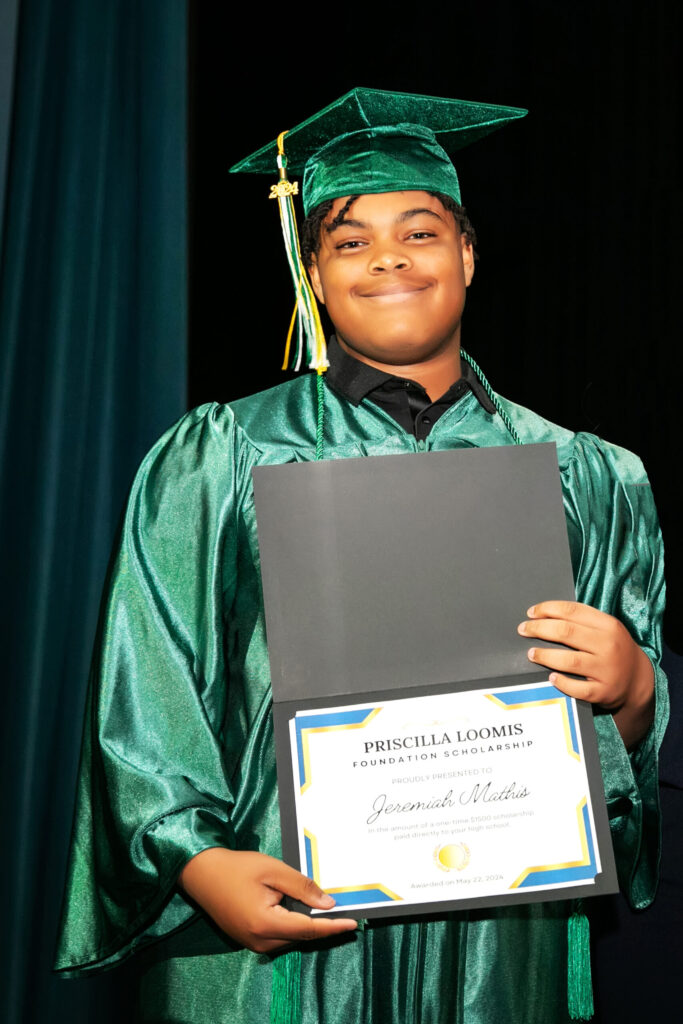
So, like his sister, Jeremiah headed crosstown to Academy Prep, where he said he benefited from the school’s academic environment and the self-discipline the teachers try to instill in the students.
Jeremiah said he became more extroverted during his years at Academy Prep.
“I was naturally a quiet person. I didn’t talk much,” he said. “Now, I talk to people. I try to start conversations.”
He also credited his teachers, specifically Zack Brockett, a science teacher, for guiding him toward being a young adult.
“He pushed us to grow up, so that we can go into high school as mature students,” Jeremiah said.
His teachers at Academy Prep describe Jeremiah as a quiet student who completed his assignments on time, helped out around campus, and amazed them with his drawing ability.
“Jeremiah is very self-driven,” Britanny Dillard, Academy Prep’s assistant head of school, said. “He’s one of those people that you kind of underestimate because he's so quiet that you don't even truly realize the talents that he actually has. He’s not the first to raise his hand, but he knows the answer.”
Jeremiah was a member of the school’s track team. He threw the shot put and discus. At graduation, Jeremiah received the Priscilla E. Frederick Foundation, worth $1,500 toward the balance of his freshman year tuition at Admiral Farragut. Frederick is a former Olympic high jumper who competed for Antigua and Barbuda in the 2016 Summer Games. Her foundation awards scholarships and grants to students raised in single-parent households. Jeremiah was the first Academy Prep student to earn that scholarship.
He is a soft-spoken, unassuming young man with a growing vinyl record collection and an interest in graphic novels and comic books. He will participate in track and field this year and will take an aviation class, which he feels will benefit him when he gets to the Air Force Academy.
Jeremiah spends his high school volunteer hours at Academy Prep. He helps grade papers, organize classrooms, and move supplies around campus.
Jeremiah and Tasia are spoken highly of at Academy Prep. Both Dillard and Nash Miller said they were “heartbroken” when they learned of Tracy’s death, and both admitted they were worried for the future of the siblings.
“They only had each other, and I think it speaks highly of Tasia that she was willing to accept that role,” Dillard said.
Said Nash Miller: “The news that her grandmother passed just gutted me. She had all these plans, and she just cancelled them to be her brother’s primary caregiver. What a superhero to put her brother’s needs ahead of her own.”
When I think about the state of public education in Florida, I recall a song from “The Wiz,” the 1978 film reimagining of “The Wizard of Oz,” where Diana Ross sang, “Can’t you feel a brand new day?”
It’s a brand new day in our state’s educational history. Parents are in the driver’s seat deciding where and how their children are educated, and because the money follows the student, every school and educational institution must compete for the opportunity to serve them.
Public schools are rising to meet that challenge.
For the past year, helping them has been my full-time job.
Today, 27 of Florida’s 67 school districts have contracted with Step Up For Students to provide classes and services to scholarship students, and another 10 have applied to do so.
That’s up from a single school district and one lone charter school this time a year ago.
This represents a seismic shift in public education.
For decades, a student’s ZIP code determined which district school he or she attended, limiting options for most families. For decades, Florida slowly chipped away at those boundaries, giving families options beyond their assigned schools.
Then, in 2023, House Bill 1 supercharged the transformation. That legislation made every K-12 student in Florida eligible for a scholarship. It gave parents more flexibility in how they can use their child’s scholarship. It also created the Personalized Education Program (PEP), designed specifically for students not enrolled in school full time.
This year, more than 80,000 PEP students are joining approximately 39,000 Unique Abilities students who are registered homeschoolers. That means nearly 120,000 scholarship students whose families are fully mixing and matching their education.
Families are sending the clear message that they want choices, flexibility, and an education that reflects the unique needs and interests of their children.
Districts have heard that message.
Parents may not want a full-time program at their neighborhood school, but they still want access to the districts’ diverse menu of resources, including AP classes, robotics labs, career education courses, and state assessments. Families can pay for those services directly with their scholarship funds, giving districts a new revenue stream while ensuring students get exactly what they need.
In my conversations with district leaders across the state, they see demand for more flexible options in their communities, and they’re figuring out how to meet it.
For instance, take a family whose child is enthusiastic about robotics. In the past, their choices would have been all-or-nothing. If they chose to use a scholarship, they would gain the ability to customize their child’s education but lose access to the popular robotics course at their local public school. Now, that family can enroll their child in a district robotics course, pay for it with their scholarship, and give their child firsthand technology experience to round out the tutoring, curriculum, online courses and other educational services the family uses their scholarship to access.
Families can log in to their account in Step Up’s EMA system, find providers under marketplace and select their local school district offerings under “contracted public school services.” School districts will get a notification when a scholarship student signs up for one of their classes. From large, urban districts like Miami-Dade to small, rural ones like Lafayette, superintendents are excited to see scholarship students walk through their doors to engage in the “cool stuff” public schools can offer. Whether it’s dual enrollment, performing arts, or career and technical education, districts are learning that when they open their arms to families with choice, those families respond with enthusiasm.
Parents are no longer passive consumers of whatever system they happen to live in. They are empowered, informed, and determined to customize their child’s learning journey.
This is the promise of a brand new day in Florida education. For too long, choice has been framed as a zero-sum game where if a student left the public system, or never even attended in the first place, the district lost. That us-versus-them mentality is quickly going the way of the Wicked Witch of the West. What we are witnessing now is something far more hopeful: a recognition that districts and families can be partners, not adversaries, in building customized learning pathways.
The future of education in Florida is not about one system defeating another. It is about ensuring families have access to as many options as needed, regardless of who delivers them.
As Diana Ross once sang, “Hello world! It’s like a different way of living now.” It has my heart singing so joyfully.